Kindred Group Bundle
How Did Kindred Group Conquer the Online Gambling World?
From a bedroom startup to a global powerhouse, Kindred Group's story is a captivating tale of innovation and strategic growth within the dynamic online gambling sector. Founded in 1997, the company, initially known as Unibet, disrupted traditional betting models by embracing the burgeoning digital landscape. This journey has seen Kindred Group evolve into a major player, navigating complex regulations and market shifts to achieve its current industry standing.
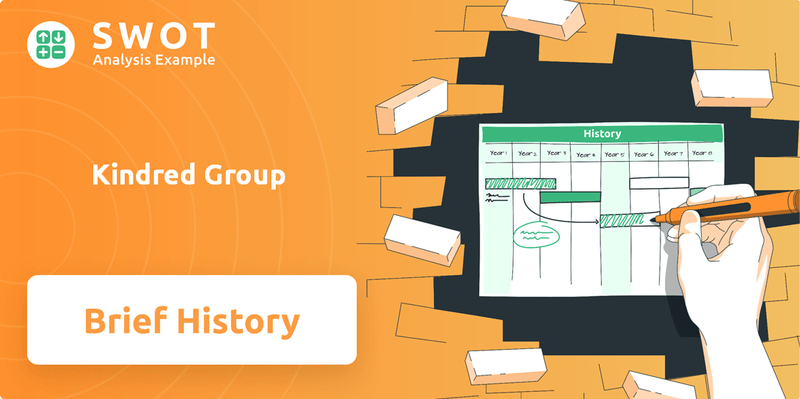
Delving into the Kindred Group SWOT Analysis reveals the strategic decisions that propelled its success. Understanding the brief history of Kindred Group, including its early days and the evolution of its brands like Unibet, provides crucial insights into the company's resilience and adaptability. The company's acquisitions and expansion strategies have significantly shaped the online gambling industry, making its story essential for anyone interested in market dynamics and business evolution.
What is the Kindred Group Founding Story?
The story of the Kindred Group company, formerly known as Unibet, begins in 1997. It was founded by Anders Ström in London, marking the start of a significant player in the gambling industry. Ström, a professional bettor, saw an opportunity to leverage his expertise, leading to the creation of what would become a major force in online gambling.
Initially, the business operated as a telephone betting service. This early approach set the stage for the company's evolution. The focus was on providing a service based on Ström's betting insights, a strategy that would soon expand into the digital realm.
The company's journey reflects a shift from traditional methods to embrace the digital age. This transition highlights the company's adaptability and foresight in recognizing the potential of the internet. As Kindred Group history unfolds, these initial steps proved crucial.
Here's a look at the key stages of Kindred Group's early development.
- 1997: Anders Ström establishes Unibet in London.
- 1998: Secures its first UK betting license.
- 1999: Launches its online platform, available in English and Swedish.
- 2001: Reaches over 200,000 customers across 80 countries.
In 1998, Unibet obtained its first UK betting license, a crucial step for legitimacy and expansion. Following this, 1999 marked a pivotal moment with the launch of its online platform. Available in English and Swedish, it signaled the company's entry into the digital world, setting a new standard in the gambling industry.
By 2001, Unibet had rapidly expanded. Within a few years, the company had over 200,000 customers across 80 countries. Services were offered in 12 languages, demonstrating its international reach. This rapid growth was fueled by a commitment to innovation and a focus on providing a safe and engaging experience. For further insights into the company's operational strategies, consider reading about the Revenue Streams & Business Model of Kindred Group.
Kindred Group SWOT Analysis
- Complete SWOT Breakdown
- Fully Customizable
- Editable in Excel & Word
- Professional Formatting
- Investor-Ready Format
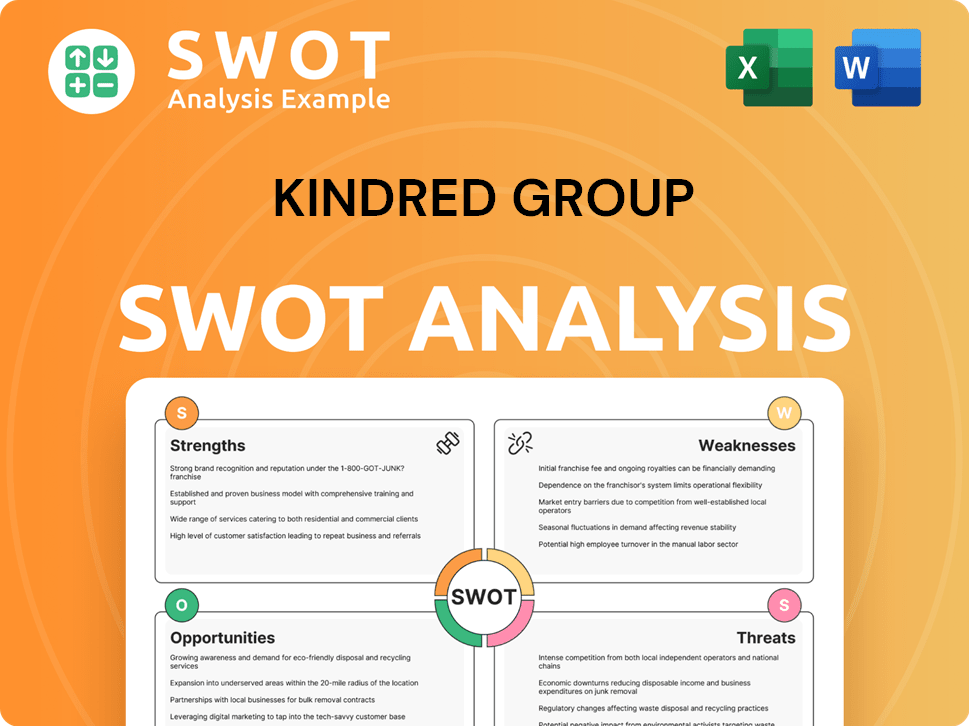
What Drove the Early Growth of Kindred Group?
The early years of the Kindred Group marked a significant period of expansion and strategic acquisitions, initially operating as Unibet. This period saw the company diversify its offerings and broaden its market reach within the online gambling sector. The company's growth strategy included the acquisition of key players to strengthen its position in the gambling industry.
In the early 2000s, Unibet expanded beyond sports betting, adding online casino and poker to its portfolio. The acquisition of Mr. Bookmaker in 2005 provided a strong foothold in the Benelux region. Furthermore, the purchase of Maria Holdings in 2007 allowed the company to enter the online bingo market.
The 2010s were marked by expansion in regulated European markets and investments in its own technology platform. This focus on proprietary technology aimed to improve product control and cost efficiency. The company rebranded to Kindred Group plc in December 2016, reflecting its multi-brand approach.
In the first half of 2024, Kindred Group reported total revenue of £635.3 million (€756.1 million), a 3.5% increase from the same period in 2023. Underlying EBITDA surged by 26.5% to £132.9 million (€158.2 million) in H1 2024. The company's Q1 2024 revenue was £307.7 million, with 84% of gross winnings revenue originating from locally regulated markets.
The company is exiting the North American market, a move expected to be complete by the end of Q2 2024. This strategic shift aims to reallocate resources to core markets in Europe and Australia. This is expected to result in annualized gross cost savings of approximately £40 million. For more information on the competitive landscape, you can read about the Competitors Landscape of Kindred Group.
Kindred Group PESTLE Analysis
- Covers All 6 PESTLE Categories
- No Research Needed – Save Hours of Work
- Built by Experts, Trusted by Consultants
- Instant Download, Ready to Use
- 100% Editable, Fully Customizable
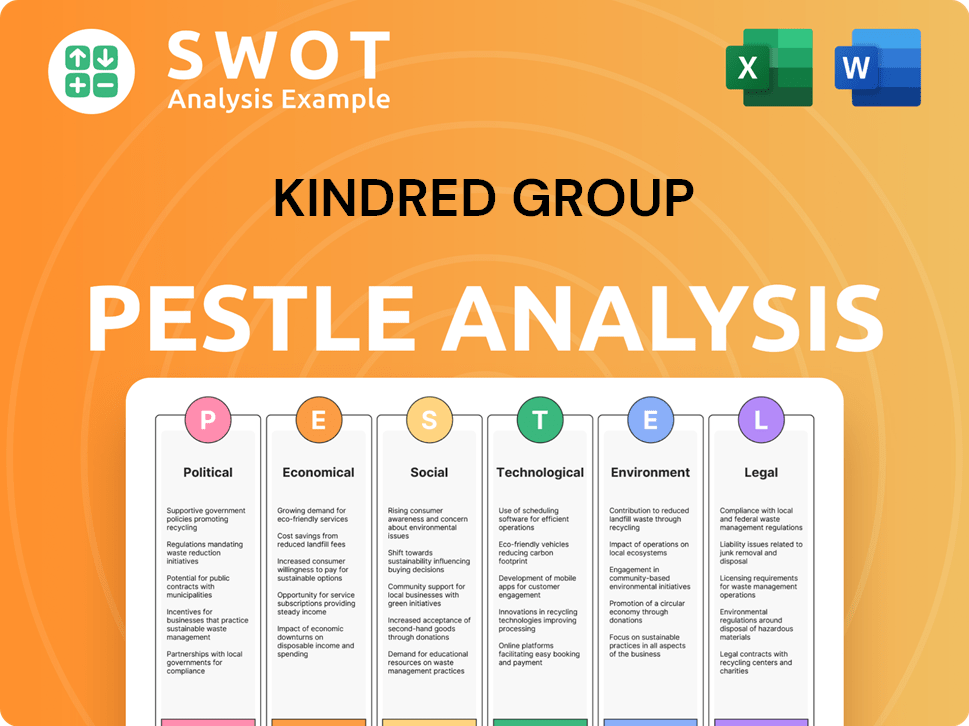
What are the key Milestones in Kindred Group history?
The Kindred Group's journey, a significant player in the online gambling industry, has been marked by strategic milestones and transformations. From its early beginnings to its current standing, Kindred Group's history reflects its adaptation to market dynamics and commitment to responsible practices.
| Year | Milestone |
|---|---|
| Early Years | Kindred Group's founding date is not specified, but the company has grown significantly over the years. |
| 2024 | The in-house sportsbook went live in Estonia in December, marking its first market launch. |
| October 2024 | Kindred Group accepted a public offer from La Française des Jeux (FDJ), a strategic decision to secure stability and growth. |
Kindred Group has consistently focused on innovation, particularly in its technological advancements. A key innovation is the development of its proprietary Kindred Sportsbook Platform (KSP), aiming to grow revenue and optimize costs.
The KSP entered a live production-testing environment in early 2024, with full deployment across all Kindred markets planned over time. This platform leverages machine learning, automation, and algorithmic decision-making.
Kindred Group is committed to achieving zero revenue from harmful gambling, showing encouraging results in reducing revenue from high-risk players. The share of revenue from high-risk players decreased to 2.7% in Q4 2024, down from 3.2% in Q3 2024.
The percentage of detected customers who showed improved behavior after interventions increased to 92.2% in Q4 2024, up from 87.3% in Q3 2024. This demonstrates the effectiveness of Kindred's interventions.
Kindred transitioned its analytics infrastructure from Adobe Analytics to Snowplow to optimize costs and improve data access. This change allows for more granular data analysis for enhanced customer journey understanding.
The Kindred Group company has faced various challenges in the competitive online gambling market. Regulatory pressures and competition from major players have significantly impacted its operations.
Regulatory pressures in key markets like the UK and Sweden have led to increased operational costs and compliance requirements. These pressures have shaped Kindred Group's strategic decisions.
Intensified competition from major players such as Flutter Entertainment, Entain, and 888 Holdings has posed a significant challenge. This has influenced Kindred Group's market strategies and expansion plans.
A low appetite for risk and exploring new approaches sometimes led to promising ideas being quickly dismissed. The company is actively working to shift this culture towards one that celebrates and supports new ideas.
In October 2024, Kindred Group accepted a public offer from La Française des Jeux (FDJ). As part of this acquisition, Kindred ceased operating in non-locally regulated markets (.com sites) by October 31, 2024.
Kindred Group Business Model Canvas
- Complete 9-Block Business Model Canvas
- Effortlessly Communicate Your Business Strategy
- Investor-Ready BMC Format
- 100% Editable and Customizable
- Clear and Structured Layout
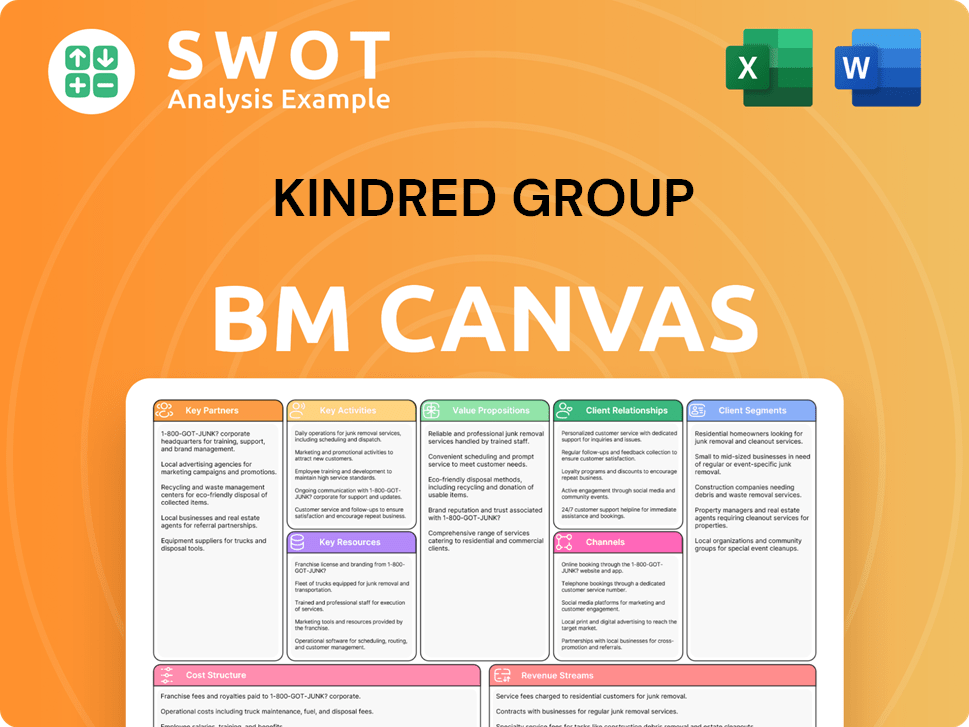
What is the Timeline of Key Events for Kindred Group?
The Marketing Strategy of Kindred Group has evolved significantly since its inception. Initially known as Unibet, the company was founded in London in 1997 by Anders Ström. Over the years, Kindred Group, which has a rich Kindred Group history, has expanded its operations through strategic acquisitions and partnerships, establishing a strong presence in the online gambling market. The company has adapted to changing regulations and market dynamics, focusing on responsible gambling and sustainable growth.
| Year | Key Event |
|---|---|
| 1997 | Kindred Group is founded as Unibet by Anders Ström in London. |
| 1998 | Unibet obtains its first UK betting license. |
| 1999 | Unibet launches its online platform, available in English and Swedish. |
| 2005 | Unibet acquires Mr. Bookmaker, gaining a foothold in the Benelux region. |
| 2007 | Acquisition of Maria Holdings, marking entry into online bingo. |
| 2011 | Unibet is awarded one of 48 licenses for the newly re-regulated Danish market. |
| 2012 | Unibet acquires Danish online bookmaker Bet24. |
| 2013 | Unibet moves its poker operation to a standalone poker site. |
| 2014 | Shareholders approve the spin-off of B2B subsidiary Kambi Group Plc. |
| December 2016 | Unibet Group plc rebrands to Kindred Group plc. |
| 2017 | Kindred Group acquires 32Red. |
| August 2018 | Kindred Group partners with Hard Rock Hotel & Casino Atlantic City, entering the US sports betting market in New Jersey. |
| January 2019 | Partnership with Mohegan Sun Pocono casino to enter the Pennsylvania sports betting market. |
| 2020 | Kindred commits to zero revenue from harmful gambling. |
| Early 2024 | Kindred Sportsbook Platform (KSP) moves into a live production-testing environment. |
| Q1 2024 | Total revenue £307.7 million; 84% of gross winnings revenue from locally regulated markets. |
| H1 2024 | Pre-tax profit increases by 50.2% to £95.4 million (€113.5 million). |
| October 2024 | La Française des Jeux (FDJ) completes its acquisition of Kindred Group. Kindred ceases operating in non-locally regulated markets. |
| December 2024 | Kindred's in-house sportsbook (KSP) goes live in Estonia. |
| Q4 2024 | Revenue from high-risk players decreases to 2.7%. |
| 2025 | Kindred expects to reduce its net financial debt by over €150 million. |
Kindred Group, now part of FDJ, anticipates continued growth and diversification. FDJ expects Kindred to contribute positively to overall group growth from FY 2025.
The proprietary sportsbook platform (KSP) is expected to be fully deployed across all markets beyond 2025. Total costs for the sports betting business are forecast to decrease by approximately 30% after full implementation.
The company aims for an underlying EBITDA of £250 million by the end of 2024. Kindred Group's financial performance is supported by its strategic initiatives.
Strategic initiatives include brand extensions, reallocation of marketing investments and tech resources to selected markets, and continued product differentiation through exclusive content. Kindred Group's expansion strategy is key.
Kindred Group Porter's Five Forces Analysis
- Covers All 5 Competitive Forces in Detail
- Structured for Consultants, Students, and Founders
- 100% Editable in Microsoft Word & Excel
- Instant Digital Download – Use Immediately
- Compatible with Mac & PC – Fully Unlocked
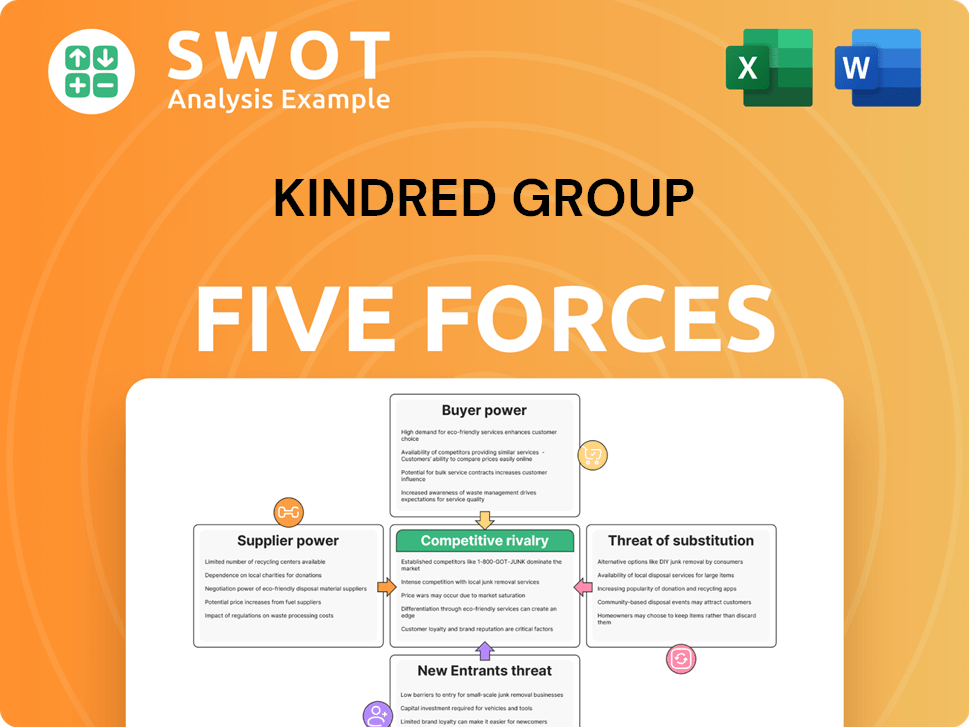
Related Blogs
- What is Competitive Landscape of Kindred Group Company?
- What is Growth Strategy and Future Prospects of Kindred Group Company?
- How Does Kindred Group Company Work?
- What is Sales and Marketing Strategy of Kindred Group Company?
- What is Brief History of Kindred Group Company?
- Who Owns Kindred Group Company?
- What is Customer Demographics and Target Market of Kindred Group Company?
Disclaimer
All information, articles, and product details provided on this website are for general informational and educational purposes only. We do not claim any ownership over, nor do we intend to infringe upon, any trademarks, copyrights, logos, brand names, or other intellectual property mentioned or depicted on this site. Such intellectual property remains the property of its respective owners, and any references here are made solely for identification or informational purposes, without implying any affiliation, endorsement, or partnership.
We make no representations or warranties, express or implied, regarding the accuracy, completeness, or suitability of any content or products presented. Nothing on this website should be construed as legal, tax, investment, financial, medical, or other professional advice. In addition, no part of this site—including articles or product references—constitutes a solicitation, recommendation, endorsement, advertisement, or offer to buy or sell any securities, franchises, or other financial instruments, particularly in jurisdictions where such activity would be unlawful.
All content is of a general nature and may not address the specific circumstances of any individual or entity. It is not a substitute for professional advice or services. Any actions you take based on the information provided here are strictly at your own risk. You accept full responsibility for any decisions or outcomes arising from your use of this website and agree to release us from any liability in connection with your use of, or reliance upon, the content or products found herein.